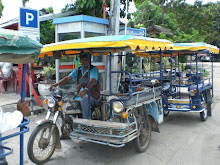Week 5 European Colonial Impact on SE Asia
Darwinism was in the air in Southeast Asia; not only in terms of colonization but within European expansionists as we saw Portugal gobbled by the Dutch, and the British inevitably leading the way in a most calculated ascension of the region.
Colonial impact in Southeast Asia obviously moved the region into the global market. Depending on who you ask, it was a mixed received yet most dramatic part of the region’s history.
On the one hand in the case of the Philippines, Spain established it with a galleon trade network with Chinese junks; established in Manila’s excellent harbor where a the countries first true, modern economy was born (Heidhues 97). The Spanish influence enabled both them and the colony to prosper.
Spain’s influence was also detrimental, leaving the Catholic Church to prosper while eliciting a diversion of funds and profits for personal use, leaving the public in debt. Spain proved they were not as resourceful as the Dutch’s VOC, murdering Chinese immigrants, opposed to the VOC using them for farming, and labor. Nearly a century after the Filipinos were westernized, US President McKinley must have missed the memo. Nonetheless after the efforts of Spain modernizing the Philippines, McKinley decided the US had a duty to “civilize” the Filipinos, more along American democratic lines (Tarling 92). After the US finished most of its business, and pulled out much military, and defense industry in the 1980s; the Filipino economy and standard of living has declined. Some Filipinos, like a friend of mine, move to Thailand to find a better life teaching.
The end results of Colonialism is that yes it improved the states of Southeast Asia, modernization efforts also complicated matters, leaving them in a vulnerable positions to this day.
If you look examine the interdependence of the region today, you will discover not one of these nations is surviving without the support, or methodologies of the west, or China; an aim that has sustained the core of colonialism.
Didn't We Almost Have It All?
There was a popular Whitney Houston ballad entitled "Didn't We Almost Have it All" indicative of the Dutch VOC. They controlled much of the SE Asian archipelago, trade routes, vital ports, and had the indigenous in their pocked but inevitably failed.
The deliberate destruction of the spice tees in the Spice Island in the 18th century by the Dutch, who were convinced that oversupply was depressing the prices for cloves and nutmeg. The measure condemned the area to chronic poverty (Heidheus 103). Nice going VOC! I am amazed out how idiotic a move this was. Hadn't anyone thought of storage? This just one knockout punch to the inept VOC.
Another brilliant move for the VOC is when they allowed British traders acces to trade in the Archipelago and the Malayan Peninslua, dealing directly with local rulers. A huge blunder, not guarding their relations with rulers they spent decades building rapport. The internal filling of their own pockets, corruption contributed to the VOC bankruptcy. Didn't they almost have it all?
History has a habit of repeating itself, as we saw the Dutch state assume the liabilities and assets of the VOC December 31, 1799; 210 years later we see a similar scene as the United States government bails out its largest corporations. We know the Dutch were regained the same postion of global power; will we see the US become less of a player after their bailout?
"Didn't we almost have it all?" is a song that will be applied to many a civilizations with the repetitive causes: greed, ineptness, and oh yeah, greed.
Bibliography
Heidhues, Mary Somers. Southeast Asia, A Concise History. New York: Thames and Hudson, 2000.
Nicholas Tarling, The Cambridge History of Southeast Asia Volume Two, Part One. (Cambridge: Cambridge University Press, 1999

No comments:
Post a Comment